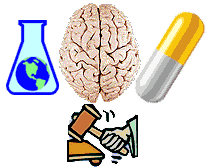Neuroscience For Kids
Neuroethics
 Neuroscience is making discoveries about the brain at an incredible pace.
For example, new drugs and treatments for mental and neurological
disorders are being developed rapidly and imaging
methods can see the living, working brain. Is neuroscience moving too
fast? What can and should be done with this new knowledge about the
brain? These are questions that concern workers in the field called
neuroethics.
Neuroscience is making discoveries about the brain at an incredible pace.
For example, new drugs and treatments for mental and neurological
disorders are being developed rapidly and imaging
methods can see the living, working brain. Is neuroscience moving too
fast? What can and should be done with this new knowledge about the
brain? These are questions that concern workers in the field called
neuroethics.

Scientists, physicians, journalists, lawyers, politicians, philosophers, clergymen and teachers are people interested in neuroethics. But we should all be interested in neuroethics because this field will impact many aspects of our daily lives. Some neuroethical issues sound like science fiction, but other issues deal with technology and drugs that are currently available. There is no turning back. Neuroscientific discoveries will continue to be made and it is best to discuss these issues before they become reality.
Neuroethics - Some Questions
 What if... machines could read
your mind?
What if... machines could read
your mind?
 Existing brain imaging methods provide
researchers and physicians with important tools to investigate the
structure and function of the living brain. These powerful techniques
help detect abnormalities in the brain and can assist in the diagnosis of
neurological and mental disorders. Brain imaging is also used in
experiments to study emotions, language and perception.
Existing brain imaging methods provide
researchers and physicians with important tools to investigate the
structure and function of the living brain. These powerful techniques
help detect abnormalities in the brain and can assist in the diagnosis of
neurological and mental disorders. Brain imaging is also used in
experiments to study emotions, language and perception.
Could machines also read your thoughts, plans and memories? We currently have a machine called the polygraph (sometimes called a lie detector). The polygraph records involuntary physiological responses such as heart rate, blood pressure, respiratory rate and sweating to see if people are lying. However, the accuracy of the polygraph for detecting lies is controversial and some people can be trained to fool the machine. Could a machine that measures brain activity detect lying accurately?
Inventors of a "brain fingerprinting" machine think they have a device that can reveal a person's knowledge of events. Brain fingerprinting measures the electrical activity of the brain through electrodes attached to the scalp. Specific stimuli (words, pictures or sounds) are presented to a person. Some of the stimuli are important to an investigation, such as a crime scene. These important stimuli are thought to produce a special brain response that indicates that the person knows something about the stimulus. Functional magnetic resonance imaging (fMRI), which measures brain blood flow, may also be able to detect areas of the brain that are active when a person lies. Two companies, No Lie MRI and Cephos Corp, are already marketing a service to detect lying.
If a device could accurately measure hidden knowledge and detect lies, how could and should it be used?

- Should people suspected of committing a crime be forced to have a brain scan? ("Did you steal the money?")
- Should suspected terrorists be brain scanned? ("Do you belong to a terrorist group?")
- Would employers be within their rights to have their employees undergo a brain scan? ("Can you be trusted with our company secrets?")
- Should people use brain scans on their spouses and children? ("Were you at the game last night?")
- If brain imaging could measure morality or intent, should it be used? ("Do you plan to rob the store?")
- If a brain scan could measure talents such as musical or mathematical ability, should it be used to direct people toward or away from certain jobs?
Memories are very fragile and can change over time. Would such a brain scan be able to detect "false memories" or memories that people believe to be true, but are not true? In specific experimental situations, some brain areas (the posterior medial temporal lobe) do respond differently to true memories and false memories.
 What if... machines
could predict a future neurological or mental disease?
What if... machines
could predict a future neurological or mental disease?
Brain imaging can identify structural and functional differences in people with various neurological and mental disorders. For example, magnetic resonance imaging has shown that people with schizophrenia have larger than normal lateral ventricles, reduced hippocampus size, changes in the size of basal ganglia nuclei, and abnormalities in the prefrontal cortex. Currently, genetic testing can be used to screen for particular illnesses, such as Huntington's disease. Perhaps a brain scan will enable detection of other neurological and mental disorders.
- What if a machine or test could predict a disorder before any symptoms were present, perhaps even before a baby is born?
- Would you want to know if you were going to have a neurological or mental disorder?
- Should people be forced to get treatment to avoid problems of their condition?
- Should insurance companies require a brain scan before they issue a health policy?

 What if... drugs
could alter your personality?
What if... drugs
could alter your personality?
Drugs that alter mood are already available. Antidepressants and tranquilizers are used by millions of people every day: people with schizophrenia are treated with antipsychotics; children with attention deficit hyperactivity disorder (ADHD) are treated with stimulants. In the future, drugs might alter a specific personality characteristic. For example, perhaps a drug could be made to fight shyness.
- If a drug could reduce aggression, should it be given to people convicted of violent crimes?
- Could and should a pill be developed to eliminate specific phobias, such as the fear of flying?
 What if... drugs,
machines or genetic engineering could increase your memory and
intelligence?
What if... drugs,
machines or genetic engineering could increase your memory and
intelligence?

We now have drugs to slow memory problems associated with Alzheimer's disease. Many drug companies, including Memory Pharmaceuticals, a company founded by Nobel Prize winner Dr. Eric Kandel, are developing new chemicals to improve memory.
- Should drugs be developed to increase the intellectual abilities of people without any illness or disorder?
- Would it be a good idea to take a pill to improve your memory and attention or would there be significant side effects?
- If such a "smart pill" existed, who should get it?
- Do we already have drugs, such as caffeine and nicotine, to improve performance? If so, are these any different than a new smart pill?
- Would smart pills make people happier or more depressed?
- In 1999, researchers genetically engineered a mouse that outperforms regular mice on learning and memory tasks. Should this technology be used in humans to produce people with superior mental abilities?

Technological advances already assist people with hearing and visual problems. For example, cochlear implants are used to improve hearing and the development of an artificial retina is progressing.
- Could and should we develop a machine-brain implant to boost intelligence?
- If these methods existed, who would get them? Some people believe that these methods would be used only by those rich enough to buy them.
- If everyone took a smart pill, would "normal" intelligence have to be redefined? Would this change put pressure on people to take the pill?
- Is taking a pill to increase intelligence a form of cheating? Is taking a pill no different than enrolling in a study class or getting special tutoring?
- Does it matter how intelligence is improved?
 What if... memories could be
erased?
What if... memories could be
erased? 
Drugs to improve memory might sound like a good idea, but drugs to erase memories might also be useful. In fact, some drug companies are trying to develop chemicals to block the formation of memories. These drugs might be used to remove the memory of a traumatic event and help a victim recover. On the other hand, traumatic events can serve as a learning tool that emphasizes the danger of the event -- erasing memories may prevent a person from avoiding a traumatic situation in the future.
 What if... the brain could
be controlled from a distance?
What if... the brain could
be controlled from a distance?

Areas of the brain can be stimulated or suppressed by placing a transcranial magnetic stimulator (TMS) over the scalp. The TMS directs magnetic fields toward the brain and has been used to study movement, sensation and memory. Magnetic stimulation has also been used to treat depression and epilepsy.
- What if magnetic fields could be directed at someone from a distance?
- How would magnetic fields affect behavior and thought?
- Could this technology be used without a person's knowledge?
- Would this be an invasion of privacy?
- Could this technology be used as a weapon?
 The Future
The Future
Although new discoveries will likely lead to machines and drugs that can enhance the brain, the question becomes what should be done with these new drugs and new technology. Will people lose their sense of self if they take one of these new drugs? Will they become less human if they are implanted with a computer chip to aid their memory? What are the long-term effects of enhancing intelligence?
These questions must be discussed and debated NOW!
They Said It! |
"Neuroethics is the examination of what is right and wrong, good and
bad about the treatment of, perfection of, and welcome invasion or
worrisome manipulation of the human brain." --- William Safire (quoted by R. Fischback and G. Fischback in Hard Science, Hard Choices by Sandra J. Ackerman, 2006.) |
References and further information about neuroethics:
- Neuroethics: Mapping the Field - from Dana Press.
- No Child Left Behind Without a Brain Scan - Cerebrum, 2005.
- Blank, R., Brain Policy. How the New Neuroscience Will Change Our Lives and Our Politics, Washington, D.C.: Georgetown University Press, 1999.
- Cabeza, R. Rao, S.M., Wagner, A.D., Mayer, A.R. and Schacter, D.L., Can medial temporal lobe regions distinguish true from false? An event-related functional MRI study of veridical and illusory recognition memory, PNAS, 98:4805-4810, 2001.
- Chatterjee, A., Cosmetic neurology: The controversy over enhancing movement, mentation, and mood, Neurology, 63:968-974, 2004.
- Farah, M.J., Emerging ethical issues in neuroscience, Nature Neuroscience, 5:1123-1129, 2002.
- Law and the Brain, in Philosophical Transactions: Biological Sciences, November 29, 2004.
- Neurocognitive enhancement: What can we do and what should we do? - Nature Reviews Neuroscience, 5:421-425, 2004.
- Is It Ethical to Use Enhancement Technologies to Make Us Better than Well? - PLoS Medicine, December, 2004.
- Neuroethics.upenn.edu [publications]
- Neuroethics Imaging Group - Stanford University
- The President's Council on Bioethics
- Beyond Therapy: Biotechnology and the Pursuit of Happiness
- Better Memories? The Promise and Perils of Pharmacological Interventions
- Remembering and Forgetting: Psychological Aspects
- Happiness and Sadness: Depression and the Pharmacological Elevation of Mood - I
- Happiness and Sadness: Depression and the Pharmacological Elevation of Mood - II
Copyright © 1996-2021, Eric H. Chudler All Rights Reserved.
